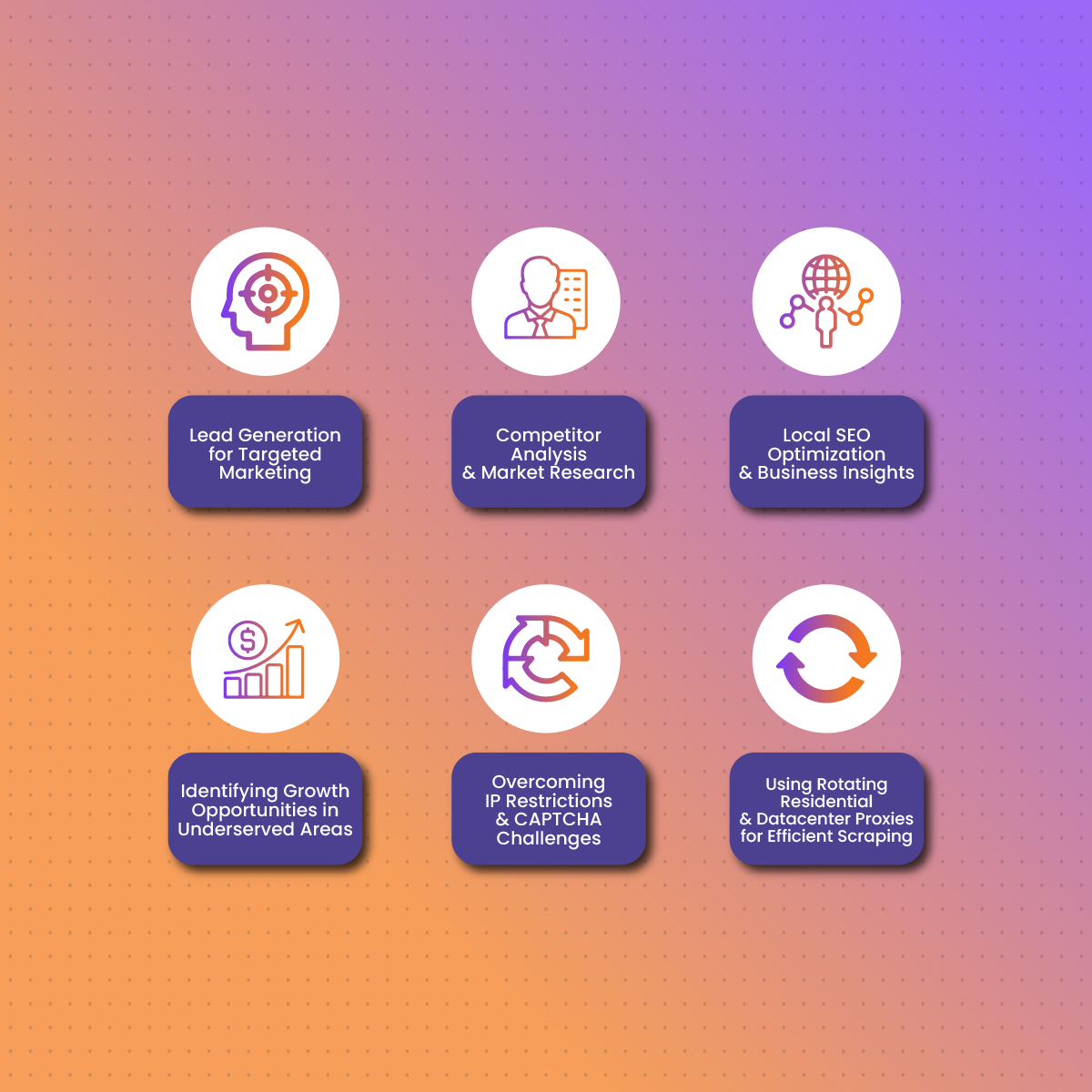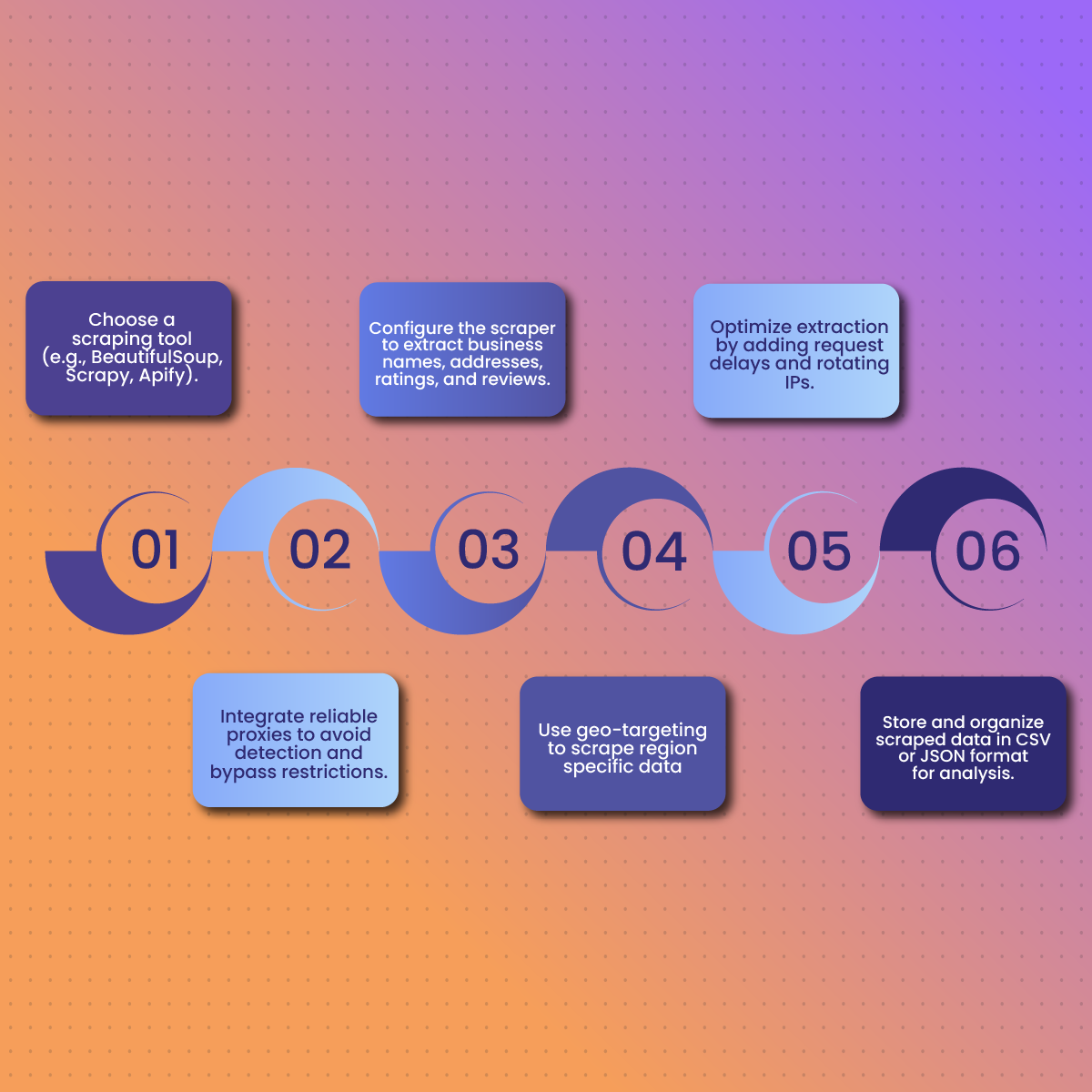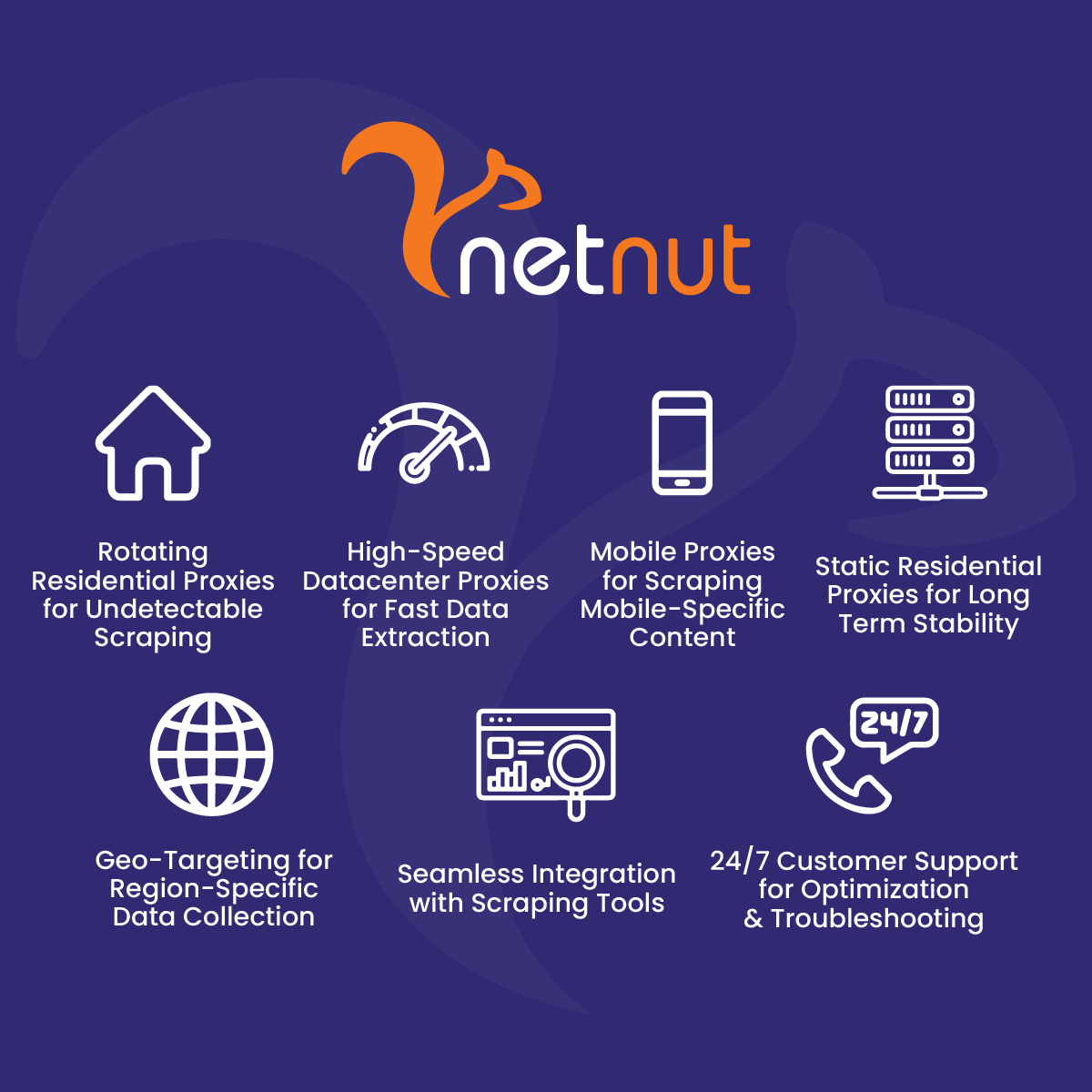Google Maps is a treasure trove of data for businesses and developers. It offers access to detailed information about businesses, locations, reviews, contact details, and much more. Whether you’re generating leads, conducting market research, or analyzing competitors, scraping data from Google Maps can provide valuable insights to fuel your strategies. However, manual data collection from Google Maps can be time-consuming and inefficient, especially when dealing with large datasets.
Scraping Google Maps offers a solution by automating the data extraction process. But to do so effectively, you need the right tools and techniques, including proxies that ensure your scraping activity remains anonymous and secure. At NetNut, we provide a range of proxy solutions, such as rotating residential proxies, datacenter proxies, and mobile proxies, to simplify and enhance the process of Google Maps scraping. This guide will walk you through the essentials of scraping Google Maps data while maintaining efficiency and compliance.
Why Scrape Google Maps Data?
Google Maps data scraping offers immense benefits for businesses, developers, and marketers. One of the primary use cases is lead generation. By extracting business names, contact details, and locations, companies can build comprehensive lead lists for targeted marketing campaigns or outreach efforts. This is especially valuable for industries like real estate, retail, and B2B services.
Another significant benefit is market research. Businesses can analyze competitors’ locations, reviews, and ratings to gain insights into market trends and consumer behavior. This data can help identify opportunities for growth, such as expanding into underserved areas or improving customer satisfaction based on feedback.
Scraping Google Maps is also crucial for local SEO optimization. By collecting and analyzing localized business data, companies can fine-tune their online presence to rank higher in location-based searches. This includes gathering information about competitors’ keyword strategies, customer reviews, and service offerings.
Despite its advantages, scraping Google Maps comes with challenges, such as IP restrictions, rate limits, and CAPTCHA verifications. This is where NetNut’s proxy solutions come into play. Our rotating residential proxies automatically assign a new IP address for every request, ensuring that your scraping activity remains undetected. For high-speed tasks, our datacenter proxies offer the performance needed to extract data efficiently without interruptions.
Challenges of Scraping Google Maps
While scraping Google Maps can provide valuable insights, it’s not without its challenges. Google employs robust anti-bot measures to protect its platform from excessive or unauthorized data scraping. One of the primary challenges is IP restrictions, where Google identifies and blocks repeated requests originating from the same IP address. This can disrupt your data collection process and potentially lead to temporary or permanent IP bans.
Another common challenge is dealing with CAPTCHAs and anti-bot systems. Google uses these tools to detect and block automated scraping activity. Without proper safeguards, you may encounter frequent CAPTCHAs that slow down your process or even make it impossible to continue scraping. Additionally, Google enforces rate limits, restricting the number of requests a user can make within a specific time frame. Exceeding these limits triggers temporary blocks, further complicating data extraction efforts.
These challenges highlight the need for a reliable proxy solution to ensure smooth and secure scraping. NetNut’s rotating residential proxies solve these issues by automatically switching IPs for every request, mimicking organic user behavior. This reduces the risk of detection and allows you to bypass IP restrictions and CAPTCHAs seamlessly. For projects requiring high-speed performance, our datacenter proxies deliver the speed and reliability needed for large-scale data collection.
How to Scrape Google Maps Data
To effectively scrape data from Google Maps, you need a combination of robust scraping tools and reliable proxies. The first step is to choose a scraping tool that suits your needs. Popular options include Python libraries like BeautifulSoup and Scrapy or automation platforms like Apify. These tools allow you to extract business names, addresses, ratings, reviews, and other essential data from Google Maps efficiently.
Once you’ve selected your tool, integrating proxies is crucial for maintaining anonymity and avoiding detection. NetNut’s proxies are specifically designed to support scraping activities, ensuring that your requests appear as though they originate from different users and locations. By routing your traffic through our residential proxies, you can access Google Maps without triggering restrictions or rate limits.
After setting up your scraping tool and proxies, focus on optimizing your extraction process. For example, implement delays between requests to mimic human behavior and avoid raising red flags. Use geo-targeting to scrape data from specific regions or countries by selecting IPs from NetNut’s extensive pool of over 85 million IPs. Once the data is extracted, ensure it is organized and stored in a format that’s easy to analyze, such as CSV or JSON files.
With the right tools and NetNut’s advanced proxy solutions, you can overcome the challenges of scraping Google Maps and extract valuable data efficiently and securely.
Best Practices for Scraping Google Maps
To ensure a successful and efficient scraping process, it’s essential to follow best practices that minimize risks and maximize output. The first key practice is to use IP rotation. By assigning a new IP address to each request, you can avoid detection by Google’s anti-bot systems and continue scraping without interruptions. NetNut’s residential proxies automate this process, providing dynamic IPs from real residential devices to maintain authenticity and anonymity.
Another important practice is to adhere to Google’s policies and ethical scraping guidelines. While data scraping can be a powerful tool, it’s crucial to scrape responsibly and only extract publicly available information. Avoid overloading Google’s servers by setting delays between requests to mimic human browsing behavior. This not only reduces the risk of detection but also helps maintain the stability of your scraping activities.
Using geo-targeted proxies is another effective strategy. Google Maps displays location-specific data, and proxies from the desired region are essential for accessing this information. NetNut’s geo-targeting feature allows you to choose IP addresses from specific countries or cities, ensuring accurate and localized data collection.
Additionally, always monitor your scraping performance and adjust configurations as needed. Regularly test your proxy connections and scraping tool to ensure they work seamlessly together. NetNut’s proxies provide 99.99% uptime, so you can rely on consistent performance during large-scale scraping operations.
Finally, securely store and organize the data you collect. Use structured formats like CSV or JSON files to make the data easy to analyze and integrate into your workflow. Following these best practices ensures that your scraping activities remain efficient, compliant, and secure.
How NetNut Proxies Enhance Google Maps Scraping
NetNut’s proxy solutions are specifically designed to simplify and enhance the process of scraping Google Maps data. By offering a range of proxy types tailored to different needs, we ensure that users can scrape data efficiently, securely, and without detection.
Our rotating residential proxies are ideal for Google Maps scraping, as they automatically change IP addresses after each request. This makes it virtually impossible for Google to detect repetitive activity, allowing you to bypass restrictions and scrape large datasets without interruptions. For tasks requiring high-speed connections, our datacenter proxies deliver exceptional performance, ensuring fast and seamless data extraction.
For users who need to scrape data from mobile-specific Google Maps content, our mobile proxies provide a unique solution. These proxies route traffic through mobile networks, mimicking real mobile user behavior for added authenticity. Additionally, static residential proxies offer long-term stability, making them suitable for consistent and repetitive scraping tasks that require a single IP address over an extended period.
NetNut’s geo-targeting capabilities allow users to scrape location-specific data by selecting proxies from desired regions or countries. With access to over 85 million IPs globally, we provide unmatched flexibility for targeting and data collection. Our proxies are easy to integrate with popular scraping tools, and our 24/7 customer support ensures that users can troubleshoot and optimize their setup with ease.
By choosing NetNut, you gain access to high-quality proxies that enhance your Google Maps scraping efforts while maintaining security, reliability, and compliance.
Final Thoughts on Scraping Google Maps
Scraping data from Google Maps is a powerful way to gather valuable insights for lead generation, market research, and localized SEO optimization. However, challenges such as IP restrictions, CAPTCHAs, and rate limits make it essential to use the right tools and techniques for a seamless and secure experience. By combining robust scraping tools with high-quality proxies, you can efficiently extract business names, addresses, ratings, and other critical information from Google Maps.
NetNut simplifies this process with its advanced proxy solutions tailored for data scraping. Our rotating residential proxies ensure every request uses a fresh IP address, reducing detection risks and ensuring uninterrupted scraping. For tasks requiring high performance, our datacenter proxies offer the speed and reliability needed for large-scale data collection. Additionally, mobile proxies and static residential proxies provide flexibility for specialized use cases, such as accessing mobile-specific data or maintaining consistent IPs for extended operations.
With features like geo-targeting, a global network of over 85 million IPs, and 24/7 customer support, NetNut proxies offer the security, speed, and scalability you need to overcome scraping challenges. Whether you’re targeting localized data or conducting large-scale scraping projects, our proxies provide the tools to achieve your goals efficiently and securely.
Ready to take your Google Maps scraping to the next level? Explore our proxy solutions today and experience the difference between reliable and high-performance scraping with NetNut.









